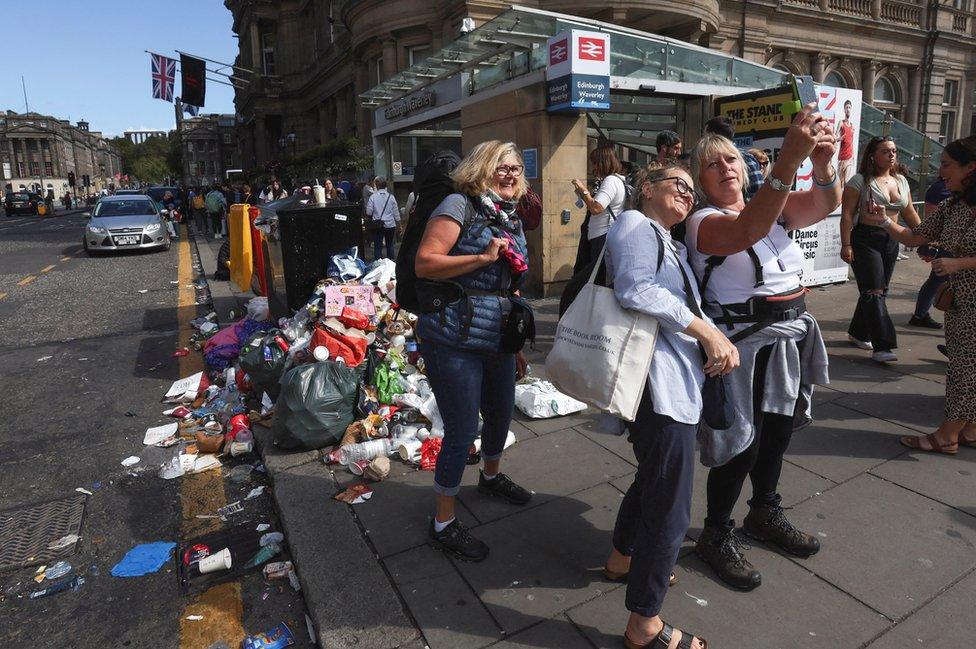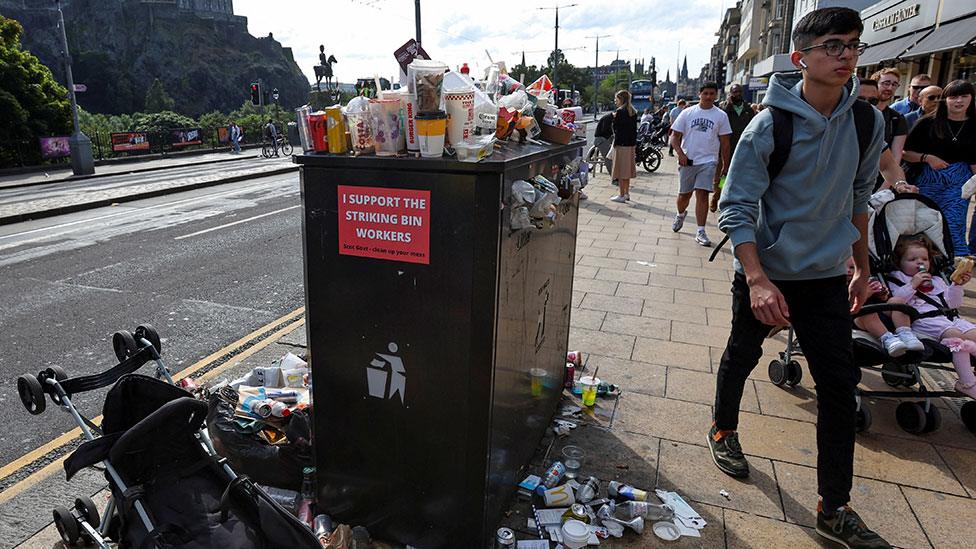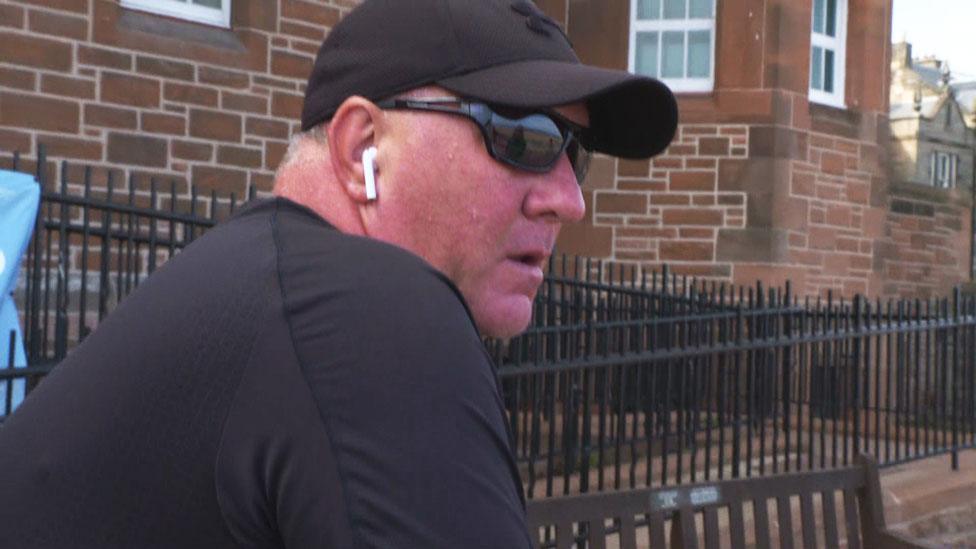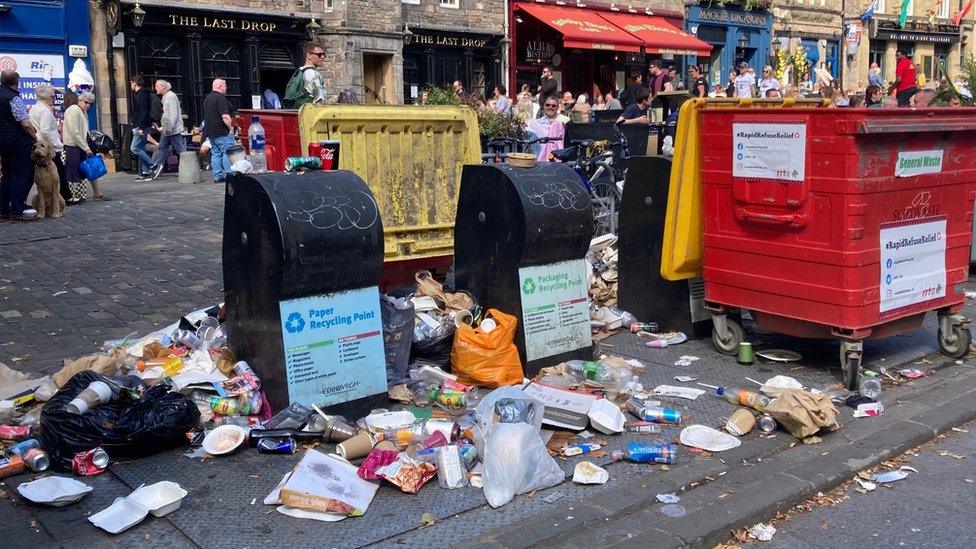Hope of new pay offer as bin strike continues
- Published

Tourists pose for pictures beside overflowing bins in Edinburgh
It is hoped a new pay offer could be made to unions in a bid to end the council strike in Scotland.
Bin strikes now affect two thirds of Scotland's local authorities and rubbish is building up in many town and city centres.
Discussions between the unions and the council's umbrella body, Cosla, took place on Sunday.
There is still no new offer but sources close to negotiations believe it is possible one may be made on Monday.
No talks are scheduled, but a revised pay offer could come from Cosla.
Kate Hagmman, Cosla's resources spokeswoman, said: "We remain in intense active discussions with our trade union colleagues."
The Scottish government has encouraged both sides to seek a "fair resolution" to the dispute.
Ben MacPherson, minister for social security and local government, told BBC Radio's Good Morning Scotland programme that after "constructive discussions over recent days" Cosla met with local government leaders to discuss a "potential proposition".
However, he said: "It would not be appropriate for the Scottish government to comment further beyond continuing to encourage both sides to continue to seek that fair resolution to the dispute that we all want to see as soon as possible.
"The unions and Cosla are the negotiating parties in this scenario. The Scottish government can't make the unions an offer because we are not the employer in this situation but we're engaged with local government leaders and we want to see a resolution to this just like everyone else."

Edinburgh's strike is due to end after Monday but more action is planned next week
Meanwhile City of Edinburgh Council said additional resources would be deployed to support the clean up on Tuesday, when the strike ends.
Council leader Cammy Day said he was continuing to press the Scottish government to fund an "acceptable settlement".
"This dispute has brought the value of our waste and cleansing teams - and their right to fair wage - into sharp focus and I'm delighted they'll be back out from Tuesday, helping to return our city to its best," he said.
"While they'll be working hard to catch up on collections and making every effort to collect litter across the city, it'll take time for things to return to normal.
"Please bear with them as they do so and, if you can store your extra waste safely for a little longer or are able to book an appointment at a recycling centre, please do so."
Residents are being asked to put their bins out as normal on their scheduled collection day, when extra waste will be collected if it is bagged.
Public Health Scotland has warned of a human health risk from overflowing waste, and advised councils to decontaminate areas where bins have overflowed.

'Pay us fair to keep the city clean'

Scott Rennox spoke to BBC Scotland in Portobello
Scott Rennox, a street cleanser in Edinburgh, spoke to BBC Scotland to explain why he was on strike.
"Everything's going up, the energy prices are going up and we're still getting the same pay," the Unite member said. "We're just letting them see what it's like if we don't get our pay."
He said he and his colleagues worked all through the pandemic.
"We're picking up more masks than we do cigarette packets now - and there's plenty of disease around them," he said.
"What we're wanting is fair pay for what we do because it's not just rubbish we're picking up, it's dog bags, needles, dead animals, glass, everything.
"We don't want to see the town black, we just want a clean city but pay us fair to keep the city clean."
He said he was hopeful that a deal could be struck.
"But they're talking and talking and talking - how much is there to talk about? Just sort something out and get us back to work, get the streets clean again and get us back to normal."

Unions are seeking an agreement similar to the one made to council workers in England, which included a £1,925 flat rate pay offer.
They say that offering a percentage pay rise would mean the most money would go to the best paid staff.
The bin strike began in Edinburgh on 18 August, in the midst of festival season, after the unions rejected an initial pay offer equivalent to a 3.5% increase.
It escalated last week when refuse workers at a further 20 local authorities, including Glasgow, Aberdeen and Dundee, walked out despite a revised 5% offer.
Monday is the last full day of the current bin strike in Edinburgh but action is due to last until Wednesday in some other places. Fresh strikes are due to start next week.
Cosla had described it as "one of, if not the best offer in decades for Scottish local government workers" with some workers getting an overall 7.36% increase.
The Scottish government has given an additional £140m to councils to help fund a pay increase for staff.
But the unions - Unite, Unison and GMB - are calling for more funding from the government to pay for an improved offer.
And they have refused a government request to suspend strikes while negotiations are held with Cosla.


The council unions sense they are in a very strong negotiating position.
The strike is having a major effect on refuse collections in much of Scotland and leaving town and city centres filthy.
The threat of a second strike in just over a week means these scenes could be repeated.
This is something nobody wants to see happen.
The unions want a "flat cash offer" rather than a percentage pay rise. This means everybody would get the same pay rise but the most benefit would go to the lowest paid.
A straightforward percentage rise would mean that senior staff would get the most.

Related topics
- Published27 August 2022
